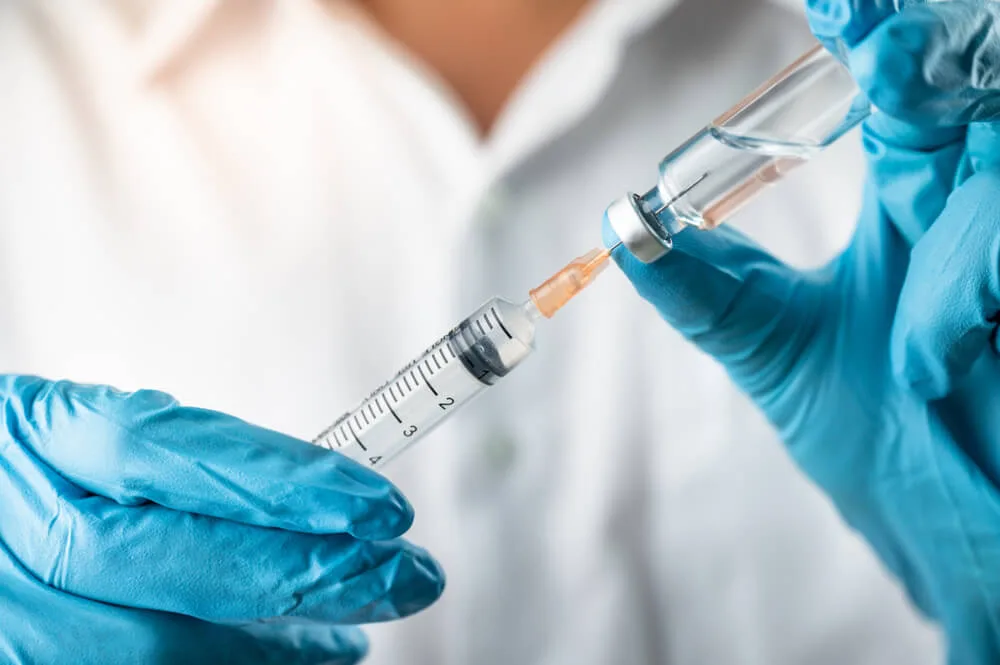
Two partially used syringes and needles are seen as Rocky Meadows, left, former addict and founder of Lifehouse treatment and recovery center, walks with two former addicts along rail tracks where addicts use drugs on October 2, 2019 in Huntington, WV. (Photo by Ricky Carioti/The Washington Post via Getty Images)
Deaths from drug overdoses increased in more than two-thirds of states last year. And the coronavirus pandemic could make it worse.
President Donald Trump attacked Hunter Biden at the first presidential debate on Tuesday night, criticizing the Democratic nominee’s 50-year-old son for leaving the military after testing positive for cocaine.
But Trump’s weak and distracting broadside against Hunter Biden also highlighted how the president’s economic and drug policies have failed millions of people battling drug addiction in the United States.
Trump’s attack on the younger Biden came after former Vice President Joe Biden said Trump has driven division in the country. Biden condemned Trump for calling people who serve in the military “losers,” noting that it’s a great insult to many soldiers, like his elder son Beau, who fought for the United States in Afghanistan and Iraq. Beau died of brain cancer in 2015.
“I don’t know Beau. I know Hunter,” Trump said, interrupting Biden. He then falsely claimed that Hunter was dishonorably discharged. “Hunter got thrown out of the military. He was thrown out, dishonorably discharged for cocaine use. And he didn’t have a job until you were vice president.”
“That is simply not true,” Biden responded. “My son, like a lot of people, like a lot of people you know at home, had a drug problem. He’s overtaken it. He’s fixed it. He’s worked on it. And I’m proud of him.”
But for many Americans, the Trump administration’s policies have not helped them or their loved one fight addiction. Federal data shows the death rate from opioid overdoses increased in 2019 by nearly 5%. In July, the Center for Disease Control (CDC) found nearly 71,000 people died from drug overdoses, an all-time high for the US. Overdose deaths have increased in about 35 states last year. Additionally, South Dakota, North Dakota, and Alaska have seen the largest spike in deaths, with the number of people dying from an overdose increasing 54%, 31%, and 27%, respectively.
And the opioid crisis has worsened during the coronavirus pandemic. For example, in Rockingham, North Carolina, hospitals saw a 46% jump in opioid-related emergency room cases between January and August 2020. Health experts expect that the social isolation and job losses that come from the pandemic will only exacerbate the opioid crisis even further.
According to these health experts, the alarming statistics are a result of Trump’s misguided action—and inaction—on the country’s opioid epidemic. While Trump boasts hardline stances on drugs, his administration has failed to do anything significant in curbing overdoses.
Instead, Trump has spent billions of federal taxpayer dollars on building a wall between the US-Mexico border to help keep out drugs. He has proposed harsher prison sentences—and even the death penalty—for drug dealers, despite research showing it does little to halt the flow of drugs into the country.
Meanwhile, Trump’s lack of a healthcare plan also endangers millions of people who are affected by the opioid crisis. His efforts to repeal the Affordable Care Act (ACA) and eliminate Medicaid would prevent people from getting the addiction treatment and rehabilitation they need to survive. A 2020 study from JAMA Network Open revealed that expanding Medicaid could lead to a 6% decrease in deaths from an opioid overdose.
The Trump administration also proposed cutting funding for the Office of National Drug Control Policy by 95%, virtually eliminating several drug rehabilitation and drug prevention educational programs.
The Trump administration has also failed to improve what addiction treatment exists. Several reports found the drug treatment facilities that do exist are often fraudulent, and safe needle exchanges that save lives are grossly “underused.” Furthermore, despite the rise in opioid deaths, doctors in the country are still excessively prescribing opioids.
Biden, who has witnessed the heartbreaking realities of drug addiction, has a plan to combat the opioid crisis. He wants to invest $125 billion in the next 10 years towards addiction treatment, prevention, and recovery programs. He also wants to end the overprescribing of opioid pain killers, and incentivize healthcare providers to seek safer methods to manage chronic pain. The Democratic candidate wants to pay for this plan by placing higher taxes on pharmaceutical companies’ profits.
Politics

Teamsters and UPS Reach Tentative Deal to Avoid Strike, 340,000 Workers to Get Raises
The tentative deal represents a huge win for full- and part-time UPS Teamster workers, who would get significant pay raises and better working...



One Republican Senator Is Blocking 265 Military Promotions, Leaving the Marines Without a Confirmed Leader
Sen. Tommy Tuberville's decision means these military officers are not getting the pay raises they’re owed, cannot move their families to wherever...
Local News



Teamsters and UPS Reach Tentative Deal to Avoid Strike, 340,000 Workers to Get Raises
The tentative deal represents a huge win for full- and part-time UPS Teamster workers, who would get significant pay raises and better working...



One Republican Senator Is Blocking 265 Military Promotions, Leaving the Marines Without a Confirmed Leader
Sen. Tommy Tuberville's decision means these military officers are not getting the pay raises they’re owed, cannot move their families to wherever...




